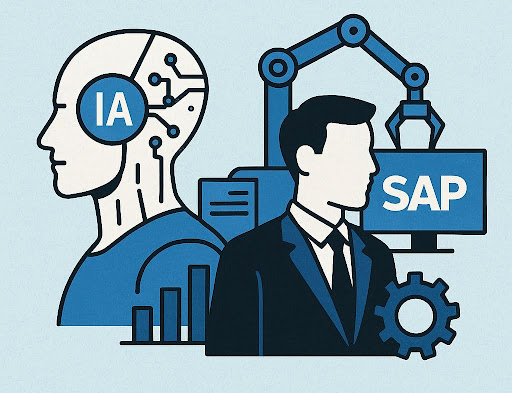Artificial Intelligence and Automation: The Impact of SAP Technologies on the Job Market

By Zoe Carmichael
The rapid adoption of automation and artificial intelligence (AI) technologies, driven by platforms like SAP Business Technology Platform (BTP), is sparking profound changes in the global job market, according to Brazilian expert Dinarte Spadari Neto, an SAP solution architect and senior member of IEEE. Widely recognized for his involvement in digital transformation projects with SAP, Dinarte warns that these changes are immediate and have a particularly strong impact on sectors such as manufacturing, logistics, finance, and information technology.
Dinarte is at the forefront of applying AI and intelligent automation in multinational companies. “The impact is direct: repetitive tasks are being automated at a high speed. This forces professionals to quickly evolve into more analytical and strategic roles,” he states.
In practice, technologies integrated with SAP BTP – such as SAP RPA (Robotic Process Automation), Intelligent Workflows, and AI algorithms – are accelerating the replacement of manual processes in large organizations. Projects led by Dinarte have significantly reduced the processing time for internal approvals and increased user efficiency through enhanced Fiori interfaces.
According to Dinarte, the key differentiator of SAP BTP lies in its ability to combine real-time business data with automated, adaptable workflows, providing scalability and secure integration between legacy and modern systems. “Automation through SAP has evolved from being a technical option to a matter of business survival,” he emphasizes.
A study by McKinsey predicts that by 2030, approximately 30% of human activities in corporate environments will be automated with the support of AI. This projection is backed by initiatives from companies like Exed Consulting, where Dinarte currently leads public cloud SAP projects in Brazil and Chile. These implementations, in addition to accelerating operations, have also created customized structures for automated governance and cloud cost management.
Despite these innovations, the expert stresses that intelligent automation does not necessarily mean mass unemployment. “It’s a shift in profile. Operational positions are changing rapidly, but there is a significant increase in demand for SAP developers, integration architects, data analysts, and cloud security specialists,” he explains. He also advocates for the inclusion of technical training and continuous professional development, particularly in IT and engineering fields.
In the public sector and medium-sized companies, adoption is still at a slower pace, but progress is inevitable, according to Dinarte. “Even with budgetary constraints, the pressure for efficiency and transparency is leading governments and industries to seriously consider these technologies.”
For him, Brazil has competitive potential in the global landscape, but it depends on coordinated efforts between the private sector, education, and public policies. “The country already produces excellent technical professionals, but there’s a need to foster an ecosystem more connected to the realities of Industry 4.0 and digital transformation.”
With a career that includes leadership in projects across multiple countries and extensive experience in cutting-edge SAP solutions, Dinarte sums up his message to the market: “Automation is not a threat, it’s an opportunity for evolution – as long as professionals are willing to learn and reinvent themselves constantly.”
The rise of automation and artificial intelligence, particularly with platforms like SAP BTP, is rapidly reshaping the job market, opening the door to new skill sets while eliminating obsolete roles. This new landscape requires both workers and companies to adapt swiftly to a new digital era.



